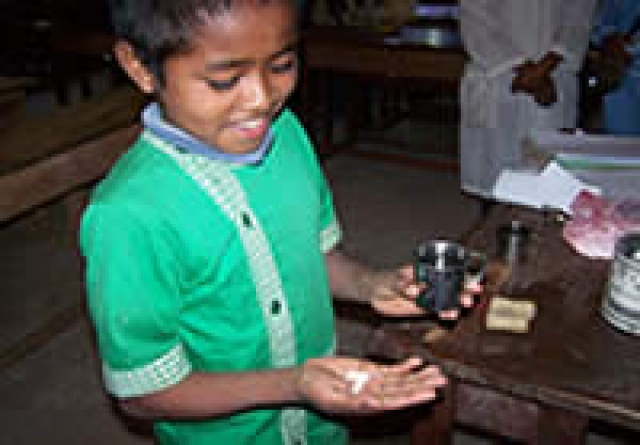Experts to meet in Accra to discuss control and elimination of Neglected Tropical Diseases
 Brazzaville, 20 June 2012 -- More than 100 experts, policy-makers and health leaders will gather in Accra, Ghana, from 25 to 27 June to discuss ways of scaling up interventions to control or eliminate Neglected Tropical Diseases (NTDs) in the African Region of the World Health Organization (WHO).
Brazzaville, 20 June 2012 -- More than 100 experts, policy-makers and health leaders will gather in Accra, Ghana, from 25 to 27 June to discuss ways of scaling up interventions to control or eliminate Neglected Tropical Diseases (NTDs) in the African Region of the World Health Organization (WHO).
The three-day Regional Stakeholders' Consultative Meeting on NTDs will bring together representatives of endemic countries, donor agencies, pharmaceutical firms, WHO and other partners to discuss and agree, among other things, coordination mechanisms at national and regional levels for NTD programme implementation.
Participants at the meeting, which also aims at obtaining stakeholder commitment for funding NTD financial resource requirements, will exchange experiences on the use of country Master Plans for decision making regarding NTD control. They will also discuss and agree on the major elements that will constitute the regional roadmap for accelerating control and elimination of NTDs in endemic countries.
Also high on the agenda of the meeting is the inauguration, on 27 June, of the WHO Regional Advisory Groups on NTDs. The principal briefs of the advisory group are to provide WHO with high quality, well considered advice and recommendations on NTD control and elimination, as well as facilitate and monitor the scale up of interventions for the control of NTDs.
"Genuine partnership and effective coordination of initiatives and actions are key to improving the efficiency and effectiveness of tools and interventions for the control and elimination of these poverty-related diseases., says WHO Regional Director for Africa, Dr Luis Sambo. He adds that "The outcomes of this Consultation should propel countries to establish, by 2015, sustainable NTD control programmes.
The Consultative meeting will be followed by the annual NTD National Programme Managers' Meeting on Preventive Chemotherapy to be held 28 to 30 June 2012.
This meeting will provide a platform for national NTD Programme Managers and their partners to review current programme strategies and performance, as well as share experiences and clarify future plans to control and eliminate NTDs in endemic countries.
__________________________________________________________________
For more information, please contact:
Dr Idrissa Sow, WHO Representative, Accra, Ghana; Tel: 0544310775; Email: sowi [at] gh.afro.who.int
Dr Felicia Owusu-Antwi; Tel: 0544310775; Email: owusu-antwif [at] gh.afro.who.int; Tel: 0244311172
Dr. Onyeze Adiele; Tel: +47 241 39 161; Fax: +47 241 39 503; Email: onyezea [at] afro.who.int
Samuel T. Ajibola; Tel 0203928687; Email: ajibolas [at] afro.who.int
NTDs are a group of 17 parasitic and bacterial infections that are the most common afflictions of the world's poorest people. They blind, disable and disfigure their victims, trapping them in a cycle of poverty and disease. Research shows that treating NTDs lifts millions out of poverty by ensuring that children stay in school to learn and prosper; by strengthening worker productivity; and by improving maternal and child health.


